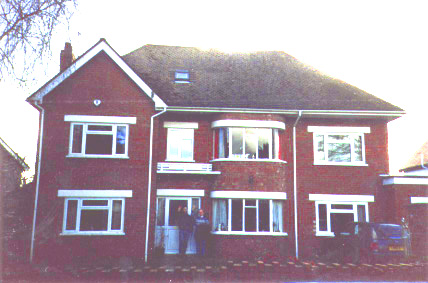
I didn't realize that Welsh was a bona fide language. I figured it like I figured Scottish or an Irish brogue to be merely thick accents on the English language. Roy, a retired scholar from the Museum of Welsh Life, who had raised Owen and his brothers to speak Welsh as their first language, would teach me otherwise.
The tiny language of Welsh, contrary to the modern trends of consolidation of such seeming anachronisms, is actually on the upswing. According to Roy, something like 10 percent of Wales speaks fluent Welsh. Apparently a revived interest in Wales' own culture has included renewed interest in its unique language.
A glimpse of the history of this part of the world, and America begins to feel like a stepchild with a stunted family history. While joining Roy on the couch for the evening's television rugby update, I began to understand the British fervor for sports (indeed, America's sport fanaticism must rank LAST of all the world's countries). Each team here represents a place with a rich and sometimes painful history. And the descendants of the people who lived through that history still live there. The rugby and English-football teams that inspire such loyalty, and occasionally incite riots, represent: Wales, Scotland, Ireland, France, England--lands that battled each other in warfare before they took to sport.
While, like many sports in this modern age, the athletes and coaches succumb to the monetary pressures of free-agency (so that the star coach and players on the Welsh team might be from New Zealand), the team still represents something that is rooted far deeper than any professional team in the U.S.. When Wales takes on England, it's like a battle for independence. Even in the most passionate of American fans, even on Super Bowl Sunday, the meaning of the sport is only a shadow of what it is in a place like Wales.
And that's part of why I think Welsh is on the upswing. There are all-Welsh television and radio stations now and more and more schoolchildren are learning Welsh. Roy says the Scots, Irish, and--uhh, what's that culture from what is modern day France, just across the channel from Dover?--are watching Wales closely, considering putting in the same effort to revive their own language and cultural heritage.
To my ear, Welsh had a comfortable rhythm and flow to it. It has unfamiliar sounds like the "dd" (kind of a thick "th") of Dafydd or the "ll" (somewhere between a breathy "h" and the Japanese "r") of Llandaff--Owen's hometown--and yet it has a familiarity that resonates somewhere deep within my Welsh genes.





![]()
Home-
Previous Entry-
Next
Entry -
Wanna Know
More?
Jump to: Phoenix
- United Kingdom - India
- Hong Kong - San
Francisco